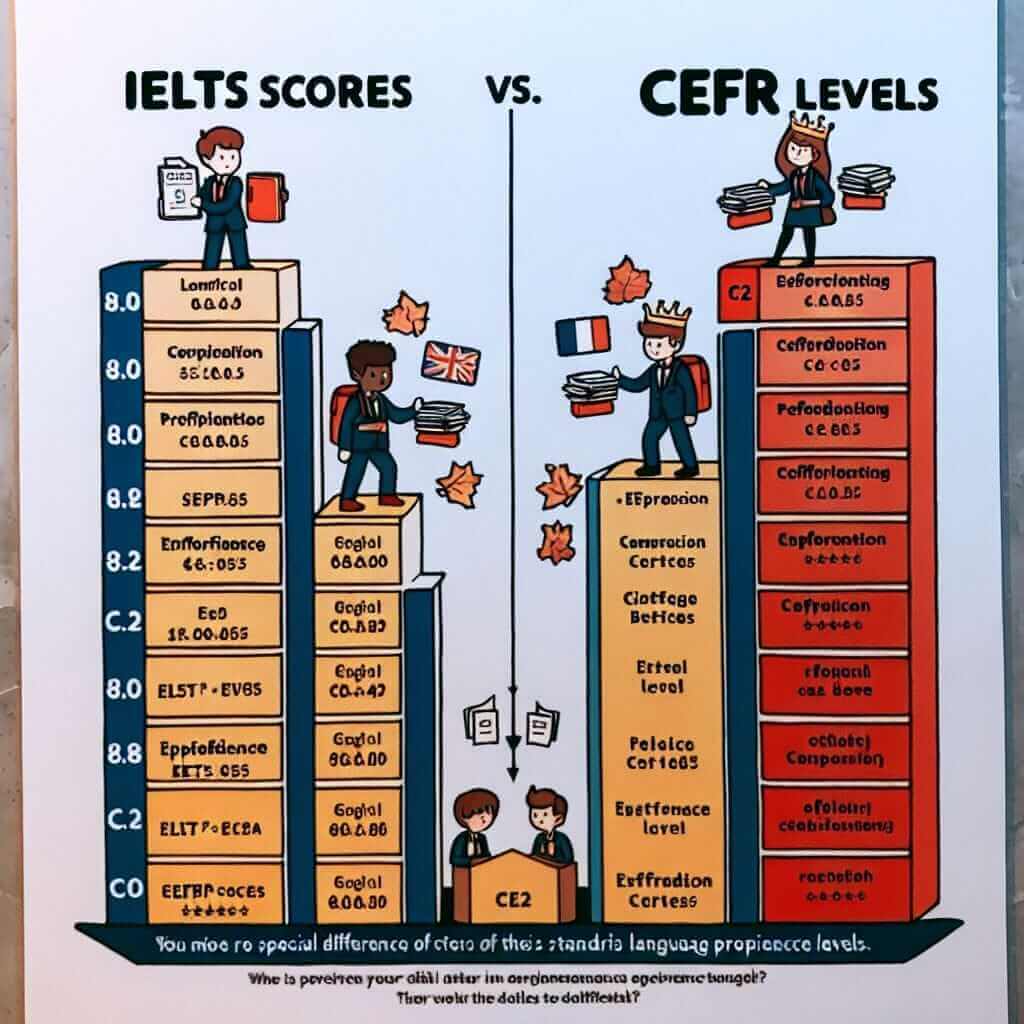For those striving for fluency in English, understanding standardized tests and proficiency scales is essential. Two widely recognized systems often cause confusion: the International English Language Testing System (IELTS) and the Common European Framework of Reference for Languages (CEFR). A common question arises: is IELTS 8.0 equal to CEFR C2? This article delves into this comparison, offering clarity for English learners and educators alike.
Understanding IELTS 8.0 and CEFR C2
What Does IELTS 8.0 Signify?
An IELTS band score of 8.0 is considered “Very Good.” An individual achieving this score has:
- A Fully Operational Command of the Language: They demonstrate fluency and accuracy in a wide range of complex situations.
- Occasional Inappropriate Usage: Minor inaccuracies might occur, but overall communication remains clear and effective.
- Handles Complex Arguments: They can understand and engage with detailed reasoning and abstract concepts.
- Flexibility and Spontaneity: They can adapt their language use to suit different contexts and audiences.
What Defines CEFR C2 Proficiency?
The highest level attainable within the CEFR framework, C2 designates a “Proficient User,” characterized by:
- Near-Native-Like Fluency: Effortless understanding and production of sophisticated language.
- High Accuracy and Nuance: Mastery over a broad vocabulary and grammatical structures, enabling precise and nuanced expression.
- Cultural Sensitivity: A deep understanding of linguistic subtleties and cultural context.
- Academic and Professional Competency: The ability to study or work effectively in environments where English is the primary language.
Comparing IELTS 8.0 and CEFR C2: Are They Equivalent?
While both IELTS 8.0 and CEFR C2 represent high levels of English proficiency, they are not directly equivalent. The table below offers a simplified comparison:
| Feature | IELTS 8.0 | CEFR C2 |
|---|---|---|
| Overall Proficiency | Very Good User | Proficient User |
| Accuracy & Fluency | Very good; occasional minor inaccuracies | Near-native fluency; high accuracy |
| Range of Language | Wide, but may lack some native-like nuance | Extensive, with nuanced understanding |
| Cultural Appropriateness | Good awareness | High cultural sensitivity |

In essence, CEFR C2 implies a slightly higher level of mastery and nuance compared to IELTS 8.0. Think of it this way: an individual with a C2 level might consistently achieve IELTS scores around 8.5 or 9.0.
Practical Implications for Learners
It’s important to remember that both IELTS and CEFR scores are indicators, not definitive measures, of language ability.
- University Admissions: Many universities that require high English proficiency for admission often accept IELTS scores of 7.0 or above. C2 may be required for specific programs, particularly in fields like linguistics or literature.
- Professional Contexts: An IELTS 8.0 demonstrates strong communication skills for many professions. However, some specialized roles (e.g., high-level diplomacy, academic research) might necessitate C2-level proficiency.
Tips for Achieving High Proficiency
Whether aiming for IELTS 8.0 or CEFR C2, consistent effort and strategic practice are key:
- Immersion: Surround yourself with English as much as possible – read extensively, watch English-language films and TV shows, and engage in conversations with native or fluent speakers.
- Focus on Accuracy: Pay close attention to grammar and vocabulary. Use reliable resources to improve your understanding of complex structures and expand your lexical range.
- Practice All Skills: Develop your reading, writing, listening, and speaking skills equally. Seek feedback from experienced teachers or tutors to identify areas for improvement.
- Engage with Authentic Materials: Utilize materials designed for native speakers, such as newspapers, academic journals, and literary texts, to enhance your grasp of idiomatic expressions and cultural nuances.
Conclusion
While an IELTS score of 8.0 reflects a commendable level of English proficiency, it’s not precisely equivalent to CEFR C2. C2 signifies a more advanced stage of mastery, akin to a near-native command of the language. Understanding these distinctions empowers learners to set realistic goals and tailor their learning journey accordingly. Remember, consistent effort and a strategic approach are vital to excel in your English language pursuits.